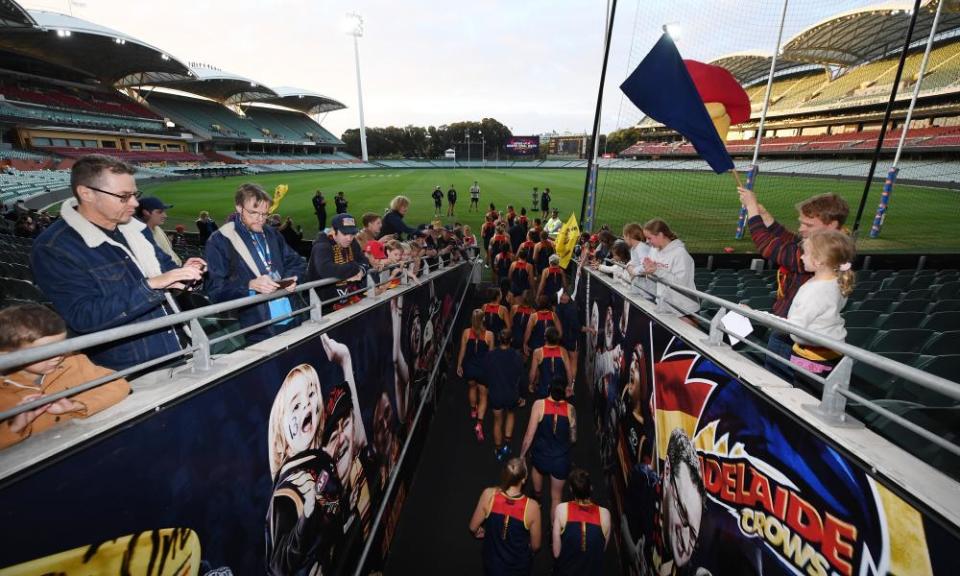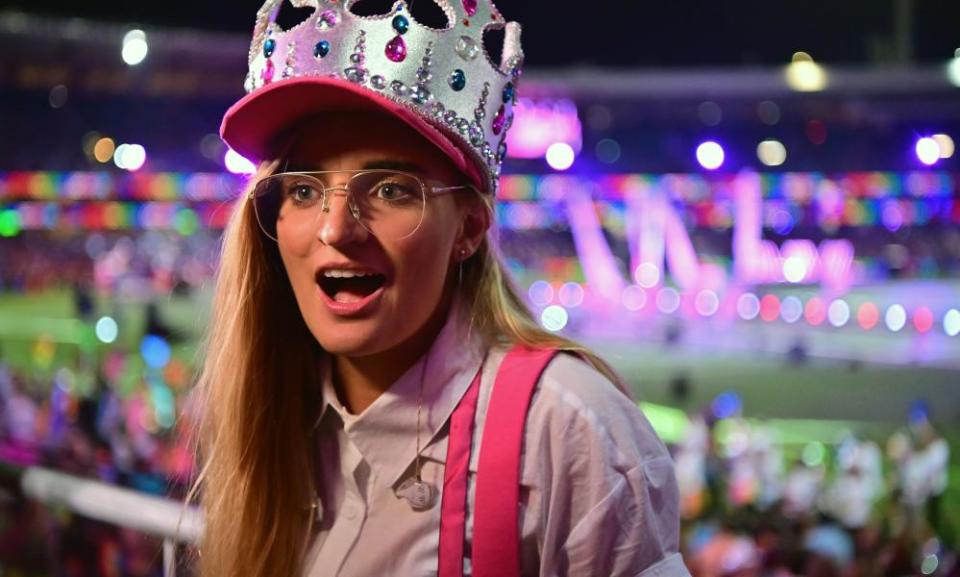AFL may belong to Victoria, but AFLW grand final feeding a national appetite

If the AFLW has proven one thing this season, it is that it is not riding the coattails of its male counterpart. There is one comparison worth drawing, though, and one which will play out in Saturday’s grand final: location.
The AFL to this day remains a Victoria-centric competition. This is evident in many facets of the game but especially so in its urgency, following last year’s unprecedented Covid-enforced move to Brisbane, to return its season decider to its traditional home of the MCG.
Contrast this with the AFLW’s travelling grand finals. The inaugural big dance in 2017 took place at the Gold Coast’s Metricon Stadium Metricon Stadium, 2018’s was staged at Melbourne’s Ikon Park, and 2019’s at Adelaide Oval. In 2021, after the cancelled finals of the 2020 season, Adelaide Oval will again play host to the biggest game of the campaign.
Related: Brisbane hope third time the charm against AFLW grand final foes Adelaide | Kirby Fenwick
This league is one based on home-ground advantage, a decision by the governing body to make the women’s elite game truly national and offer clubs more incentive to finish further up the ladder – which is just good for footy.
Indeed, Saturday’s grand final will be fought by two non-Victorian teams in the Adelaide Crows and Brisbane Lions, as a standalone event, outside Victoria. The MCG had been in contention to host. That it will not is symbolic, and tells the game’s community that the AFLW belongs anywhere the clubs and fans are.
The national identity within the competition is also bolstered by the strong state presence of clubs within the league. Of the 14 teams, six are non-Victorian in the Fremantle Dockers, Gold Coast Suns, Greater Western Sydney Giants, West Coast Eagles, Adelaide and Brisbane. Of the six which made finals this year, half were based outside the state.
And even in the league’s infancy, we are already witnessing a golden era of the Crows and Lions. This weekend will be the third time, in the AFLW’s five-year history, each club qualifies for the grand final.
It is difficult to ignore Adelaide’s dominance. Having won the flag in 2019 – and discounting the cancelled 2020 season – they enter Saturday’s match as reigning premiers out to claim back-to-back titles. The club, with two flags under their belt and gunning for a third this weekend, can cement themselves as the greatest side to date. Justifiably, Twitter is already asking: “If Adelaide wins this weekend, surely they’d be considered a dynasty?”

Similarly, Brisbane have been a dominant force with a significant grand-final presence, defeated by Adelaide in 2017 and the Western Bulldogs in 2018. This year, the team have demonstrated their strength over the course of the campaign, finishing second on the ladder, only to the Crows, and demonstrating their ability to beat tough teams. For example, they successfully stopped the Fremantle Dockers’ 11-match winning streak with an 11-point victory in round five.
The might of the club is especially impressive given only seven players from the side which met Adelaide in the 2017 grand final remain, having lost stars such as Tayla Harris to Carlton and Kate McCarthy to St Kilda. Adelaide, on the other hand, still have 12 players from their 2017 premiership outfit, including core figures Erin Phillips and Ebony Marinoff. However, the South Australian team will run out without skipper Chelsea Randall, ruled out due to concussion protocols after a nasty bump with Melbourne’s Eliza McNamara in last week’s preliminary final.
Related: Heartbreak is a privilege in 2021, and AFLW finals are gripping devastation | Kasey Symons
Yet whichever way the premiership flag will fly, it is fair to assume the grand final will be a cracker. And with this season’s upward trajectory of crowd numbers and broadcast figures, not to mention digital consumption, a decent-sized audience is expected. This week, almost 10,000 tickets were snapped up within 15 minutes of going on sale.
And so, Adelaide Oval will have the attention of footy fans nationally, the appeal further increased by AFL House scheduling it as a standalone event, meaning it will not have to compete for audiences with the AFL men’s games. It will also feature pre-game entertainment, namely Australian indie pop musician G Flip.
This kind of treatment is the proper flair fans have been calling for. As the Outer Sanctum’s Emma Race said on the podcast last week: AFLW fans want “meatloaf and all the trappings”. The women’s game has been given some deserved fanfare, further strengthening the argument that the league’s future does necessarily belong Melbourne. The south-eastern city may have footy culture embedded in its identity but, as it turns out, the entire nation has an appetite – and the AFLW is ready to feed it.

 Yahoo Finance
Yahoo Finance 